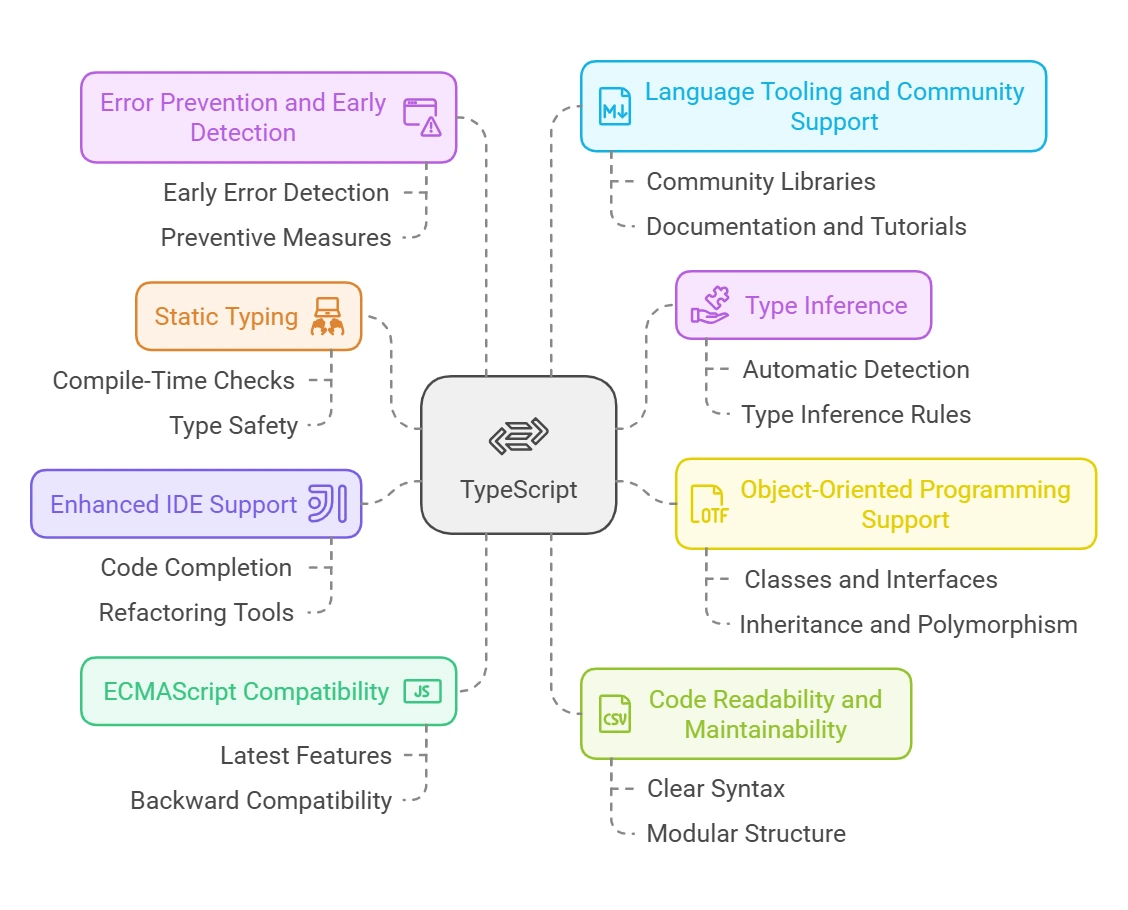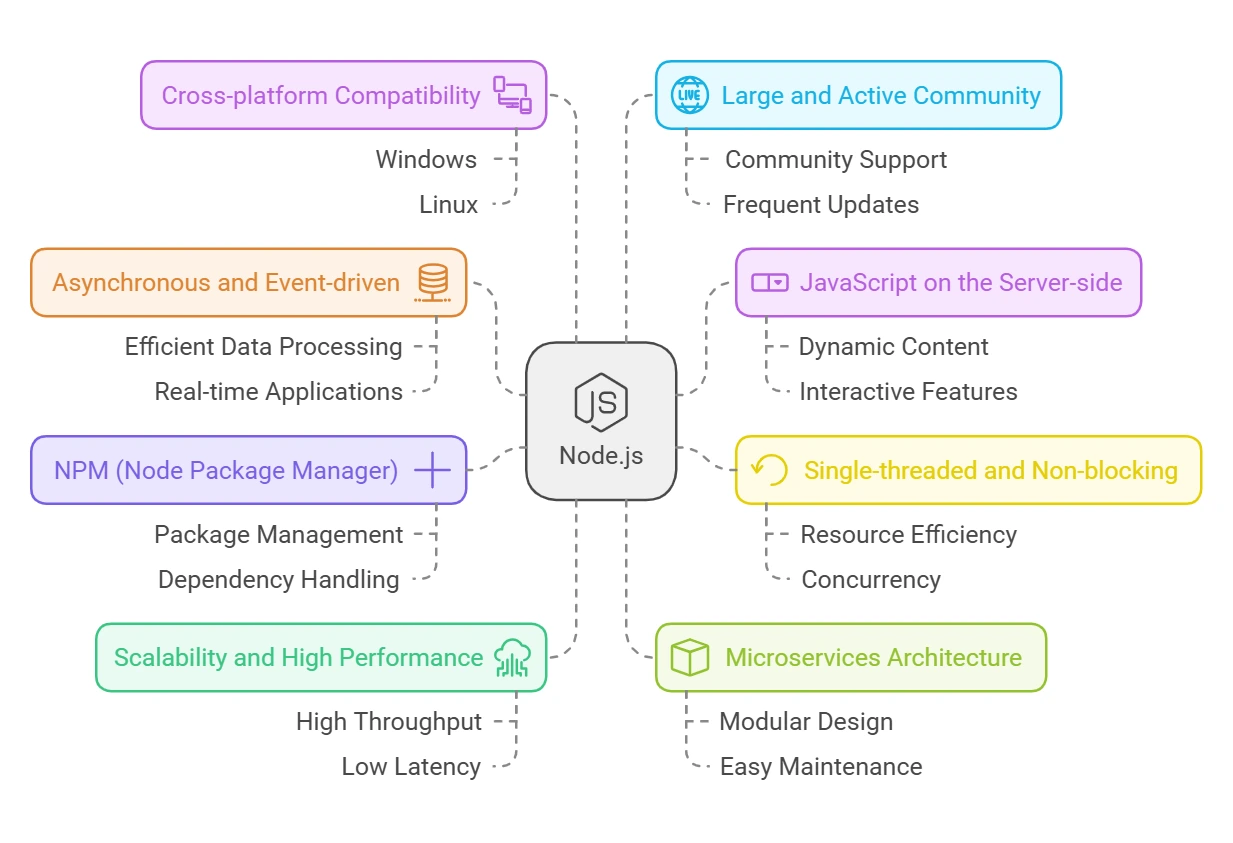To ensure success in the digital age, companies must build scalable, maintainable, and efficient server-side applications that require the right combination of tools. On the one hand, Node js provides an event-driven, non-blocking runtime that allows developers to write server-side code in JavaScript. TypeScript, on the other hand, brings static typing and improved tooling to enhance code quality and reliability. Combined, both technologies build a powerful strategy for developers. In this blog, we’ll explore the key features of both technologies, debunk misconceptions surrounding their compatibility, and highlight how leveraging the technologies together can elevate your projects.
Key Features of TypeScript
TypeScript, a statically typed superset of JavaScript, offers several key features that enhance the development experience and improve the maintainability and scalability of JavaScript applications. Some of the key features of TypeScript are:
Static Typing:
TypeScript introduces static typing to JavaScript, allowing developers to explicitly define the types of variables, function parameters, and return types. This helps catch type-related errors during the development phase and provides better tooling support, such as code completion and refactoring.
Type Inference:
TypeScript has a powerful type inference system that can automatically infer types based on context. This means that you don’t always have to explicitly annotate types, as TypeScript can often deduce them from the code. This reduces the verbosity of type annotations while still providing static type-checking benefits.
Object-Oriented Programming (OOP) Support:
TypeScript supports object-oriented programming concepts such as classes, interfaces, inheritance, and access modifiers. It allows you to write more structured and maintainable code, facilitating code organization and modularity.
Enhanced IDE Support:
TypeScript provides excellent tooling and IDE support. Most popular editors and IDEs have TypeScript integration, offering features like autocompletion, type checking, and refactoring tools. This support greatly improves productivity and code quality.
ECMAScript Compatibility:
TypeScript is a superset of JavaScript, meaning that any valid JavaScript code is also valid TypeScript code. It supports the latest ECMAScript features and syntax, enabling developers to leverage the latest JavaScript language advancements while enjoying the benefits of static typing.
Code Readability and Maintainability:
With static typing and explicit type annotations, TypeScript code tends to be more readable and self-documenting. It helps in understanding codebases, collaborating with other developers, and maintaining large-scale projects over time.
Error Prevention and Early Detection:
TypeScript catches many common programming errors, such as type mismatches, misspelled properties, or incorrect function invocations, at compile-time rather than runtime. This reduces the likelihood of encountering unexpected errors in production and facilitates early bug detection.
Language Tooling and Community Support:
TypeScript has a rich ecosystem of tools, libraries, and frameworks built specifically for TypeScript development. It also has a large and active community that contributes to its growth and provides support through online resources, forums, and documentation.

Key Features of Node js
Node js, an open-source JavaScript runtime, offers several key features that make it popular for server-side and backend development. Some of the key features of Node js are:
Asynchronous and Event-driven:
Node js uses an event-driven, non-blocking I/O model, which allows it to handle a large number of concurrent requests without blocking the execution of other operations. This asynchronous nature is particularly useful for building scalable and high-performance applications.
JavaScript on the Server-side:
Node js allows developers to use JavaScript on the server side, which provides a unified programming language for both the front-end and back-end. This means that developers can leverage their existing JavaScript skills to build full-stack applications, reducing the learning curve and improving productivity.
Single-threaded and Non-blocking:
Node js operates on a single-threaded event loop architecture, where a single thread is responsible for handling multiple concurrent requests. This design choice eliminates the overhead of creating and managing multiple threads, making Node js lightweight and efficient. Additionally, non-blocking I/O operations allow the application to handle multiple requests simultaneously without blocking the execution of other tasks.
NPM (Node Package Manager):
Node js comes with NPM, the largest package ecosystem for any programming language. NPM allows developers to easily discover, install, and manage third-party libraries and modules for their projects. This vast collection of reusable packages significantly speeds up development and enables developers to leverage existing solutions and community contributions.
Scalability and High Performance:
Node js excels in building scalable applications due to its event-driven, non-blocking architecture. It can handle a large number of concurrent connections with minimal resource usage. Additionally, Node js benefits from the V8 JavaScript engine, which optimizes JavaScript code for high performance, resulting in faster execution times.
Microservices Architecture:
Node js is well-suited for microservices architecture, where applications are built as a collection of small, loosely-coupled services. Its lightweight nature, scalability, and support for asynchronous programming make it an excellent choice for developing and managing microservices-based applications.
Cross-platform Compatibility:
Node js is designed to run on multiple platforms, including Windows, macOS, and various Linux distributions. This cross-platform compatibility allows developers to write code once and run it across different environments, making it highly portable and flexible.
Large and Active Community:
Node js has a large and vibrant community of developers who actively contribute to its growth. This community-driven ecosystem ensures regular updates, bug fixes, and the availability of numerous resources, tutorials, and libraries, making it easier for developers to learn, share knowledge, and find support.
Node js has gained popularity for building fast, scalable, and efficient server-side applications, and its rich ecosystem and community support continue to contribute to its widespread adoption.

Using Node js and TypeScript together- is it possible?
Yes, TypeScript can be used with Node js. Node js is a runtime environment that allows you to execute JavaScript code on the server side. TypeScript, on the other hand, is a superset of JavaScript that adds static typing and additional features to the language.
When using TypeScript with Node js, you write your code in TypeScript, which is then transpired into plain JavaScript before being executed by Node js. This means that you can take advantage of the features provided by TypeScript, such as static typing, classes, interfaces, and modules, while still being able to run your code in the Node js environment.
TypeScript offers several benefits when working with Node js, including improved code maintainability, enhanced IDE support with code completion and type checking, better tooling and debugging capabilities, and the ability to catch type-related errors during development. It can help you write more robust and scalable applications in Node js.
Read Also: Why hiring a Node js developers is key to building scalable web applications
Does using TypeScript mean you cannot use Node js?
The misconception that using TypeScript means you cannot use Node js likely stems from a misunderstanding of how TypeScript integrates with JavaScript ecosystems. Let’s address some common concerns:
Compatibility: TypeScript is fully compatible with Node js. Since TypeScript compiles down to JavaScript, any code written in TypeScript can seamlessly run on the Node js runtime. You can use TypeScript to write your Node js applications, leveraging its benefits such as static typing, improved tooling, and enhanced code readability.
Type Definitions: TypeScript provides type definitions for popular Node js libraries through DefinitelyTyped, a repository of high-quality TypeScript type definitions for JavaScript libraries. These type definitions enable TypeScript’s static type checking for Node js modules, ensuring type safety and better code documentation.
Tooling Support: The TypeScript ecosystem offers robust tooling support for Node js development. Popular integrated development environments (IDEs) like Visual Studio Code provide excellent TypeScript integration, offering features such as code completion, type checking, and automatic refactoring for Node js projects.
Adoption by the Community: Many developers and organizations have embraced TypeScript for Node js development. Major frameworks and libraries in the Node js ecosystem, such as Express.js, NestJS, and TypeORM, have first-class TypeScript support, making it easier to build and maintain Node js applications with TypeScript.
Using TypeScript does not mean sacrificing the ability to use Node js. On the contrary, TypeScript enhances the development experience for Node js projects by providing type safety, improved tooling, and enhanced readability.
Conclusion
In conclusion, we can say that TypeScript and Node js complement each other very well. By merging the strengths of the tech stacks, developers can build more robust, maintainable, and performant server-side applications. This synergy streamlines workflow and enhances the code quality, while instilling greater confidence in the reliability of larger-scale, complex projects. As the tech landscape continues to develop, embracing TypeScript in Node js environments will become more accessible ensuring developers remain well-equipped to tackle future challenges while delivering innovative, reliable, and scalable solutions.
At GraffersID, we have a pool of talented developers. Contact us today to hire Node js and TypeScript developers who can help you build scalable applications!




